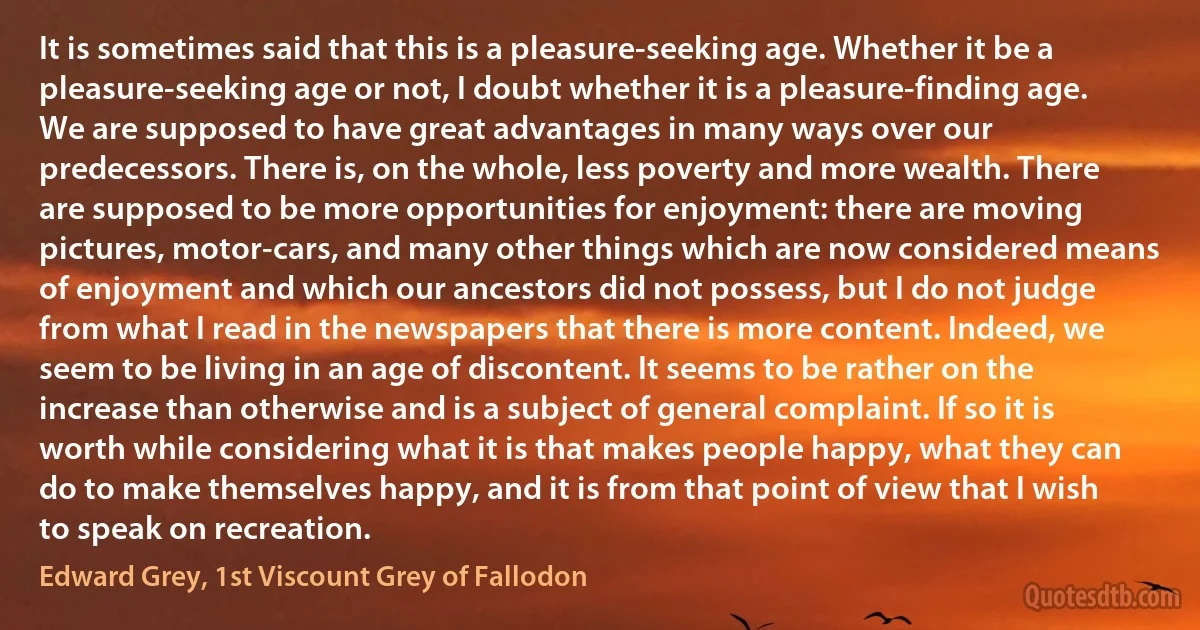
It is sometimes said that this is a pleasure-seeking age. Whether it be a pleasure-seeking age or not, I doubt whether it is a pleasure-finding age. We are supposed to have great advantages in many ways over our predecessors. There is, on the whole, less poverty and more wealth. There are supposed to be more opportunities for enjoyment: there are moving pictures, motor-cars, and many other things which are now considered means of enjoyment and which our ancestors did not possess, but I do not judge from what I read in the newspapers that there is more content. Indeed, we seem to be living in an age of discontent. It seems to be rather on the increase than otherwise and is a subject of general complaint. If so it is worth while considering what it is that makes people happy, what they can do to make themselves happy, and it is from that point of view that I wish to speak on recreation.
Edward Grey, 1st Viscount Grey of FallodonRelated topics
age considering content doubt general great happy increase judge less living moving now people point poverty read recreation say speak view wealth while wish worth means things waysRelated quotes
Unless we address those problems from the point of view of a world where development is genuinely sustainable, where protection of the environment is vital, where the earth's wealth is redistributed in favour of the poorest people in the poorest countries, in the next few years we shall face a growing imbalance between north and south. Ever-increasing numbers of people will flee from environmental destruction-from rain forest destruction, increased desertification and the increased flooding linked to that. Millions of people will have to flee from the places where they grew up and live and there will be growing imbalances in the world, and growing poverty. There has to be a change in the relationship. That means that higher prices must be paid for commodities. It means that there must be an increased aid programme, and an understanding that we are all in this together.

Jeremy Corbyn
What is the alternative to collective bargaining? There is none except anarchy, and there are rare elements in the country that would like to see anarchy in the trade unions-in my view the most dangerous thing for the country that could happen. Another alternative is force, but we may rule out force in this country, and I would lay it down that, so long as the industrial system remains as it is, collective bargaining is the right thing. I have no doubt about that. And yet we all know in our heart of hearts that it may be a clumsy method of settling disputes, and that the last word has not been spoken. Some day, when we are all fit for a democracy, we shall not need these aids, but certainly for my part, and as long as I can see ahead, unless there is that change in human nature which we are always hoping for, collective bargaining will be a necessity.

Stanley Baldwin
Critics frequently cry 'Dada' after attending one of my concerts or hearing one of my lectures. Others bemoan my interest in w:Zen. One of the liveliest lectures I ever heard was given by Nancy Wilson Ross at the Cornish School in Seattle. It was called Zen Buddhism and Dada. It is possible to make a connection between the two, but neither Dada nor Zen is a fixed tangible. They change; and in quite different ways in different places and times, they invigorate action. What was Dada in the 1920's is now, with the exception of the work of Marcel Duchamp, just art. What I do, I do not wish blamed on Zen, though without my engagement with Zen... I doubt whether I would have done what I have done... I often point out that Dada nowadays has in it a space, an emptiness, that it formerly lacked. What nowadays, America mid-twentieth century, is Zen?

John Cage
The first stable conclusion I reached ... was that the only thing brains could do was to approximate the responsivity to meanings that we presuppose in our everyday mentalistic discourse. When mechanical push comes to shove, a brain was always going to do what it was caused to do by current, local, mechanical circumstances, whatever it ought to do, whatever a God's-eye view might reveal about the actual meaning of its current states. But over the long haul, brains could be designed – by evolutionary processes – to do the right thing (from the point of view of meaning) with high reliability. ... [B]rains are syntactic engines that can mimic the competence of semantic engines. ... The appreciation of meanings – their discrimination and delectation – is central to our vision of consciousness, but this conviction that I, on the inside, deal directly with meanings turns out to be something rather like a benign "user-illusion".

Daniel Dennett
What! when it is necessary to take the most simple resolve, we are under the domination of our habitudes, our wants, our social relations, and a host of causes which, all of them, draw us about in a hundred different ways. These influences are so powerful, that we have no difficulty in telling, even when referring to persons whom we are scarcely acquainted with, or even know not at all, what is the resolution to which they will lead such parties. Whence, then, this certainty of foresight, exemplified by you daily, if you were not convinced, at the outset, that it is extremely probable the empire of causes will carry it over free-will. In considering the moral world a priori, you give to this free-will the most entire latitude; and when you come to practice, when you speak of what passes around you, you constantly fall into contradiction with yourselves.

Adolphe Quetelet
